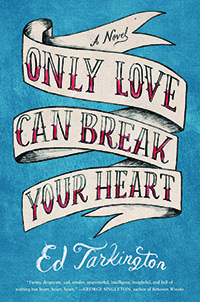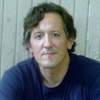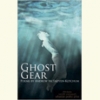Asleep at the Wheel
On the launch date of his debut novel, a Chapter 16 writer considers the failures of his past
1. Stay Alert, Arrive Alive
A few years ago, I realized something: writing had made me a reckless driver. During a single five-month period, I had four minor accidents and a dozen near-misses. I rear-ended a Lexus SUV, backed into a Dodge Charger in a parking lot, pulled out in front of a Ford Taurus coming off an exit ramp. One morning I hit my wife’s parked car in the driveway. On the bypass, I failed to monitor how fast or how slow I was going. I changed lanes without checking the blind spot or remembering to use the turn signal. I grew accustomed to honking horns and snarling faces and upraised middle fingers. My insurance premiums went through the roof.
 Glen Rose copy.jpg) I wasn’t getting behind the wheel after knocking back shots like some character in a Tom Waits song; on the contrary—my enfant terrible ways had long since yielded to respectable middle-class adulthood: wife and kids, house in a rapidly gentrifying suburb, steady job teaching high-school English. I’d outgrown most of my vices; of the few remaining, I’d dramatically curbed all but one: the desire to write novels.
I wasn’t getting behind the wheel after knocking back shots like some character in a Tom Waits song; on the contrary—my enfant terrible ways had long since yielded to respectable middle-class adulthood: wife and kids, house in a rapidly gentrifying suburb, steady job teaching high-school English. I’d outgrown most of my vices; of the few remaining, I’d dramatically curbed all but one: the desire to write novels.
To satisfy this increasingly dubious obsession alongside life’s more pressing requirements, I’d undertaken what most non-writer types would consider an absurd routine. Monday through Friday, I woke at three-thirty in the morning so I could write until six-thirty, when I’d hastily shower and dress, help get the kids ready for school, and hurry across town for work. On school nights, I tried to be in bed by 9:30, but even if I stayed up late, I answered the alarm and went downstairs to work. I believed my life as a writer was like a shark’s: if I stopped swimming, it would die. So I pushed on, regardless of how much sleep I could get, frequently driving to work perilously tired, not much safer to the world than if I’d closed down the bar with Tom Waits.
2. Starting Over
I squandered my twenties pretending to be Jack Kerouac. Eventually I went to graduate school at Florida State, where my habits improved, though I still lacked a clear sense of purpose beyond the desire to be a writer of the manly-man ilk, whatever that meant. My heroes were Philip Roth and Richard Ford, Cormac McCarthy and Robert Stone, Denis Johnson and Bob Shacochis, my mentor at FSU, to whom I attached myself like a remora. I spent a lot of time misbehaving, wrote a lot of short stories—almost all of them unpublished—and began work on a novel: a Western noir about an alcoholic ADA and an ex-con Vietnam vet who get caught between drug dealers and the corrupt local sheriff of a land-grant town in Northern New Mexico.
After the first year of grad school, I fell hard for a tough, beautiful woman whose only apparent flaw was being fool enough to marry down. Her parents accepted me politely but with understandable reluctance. (“A writer? What’s he written?”) We didn’t care; we were in love, and I was going to be a novelist. My wife maintained the role of primary breadwinner while I worked on a Ph.D. and kept pecking away at my magnum opus.
A few years later, a baby was on the way, and I was ABD, with an unfinished novel and a pauper’s salary teaching as an adjunct. We both wanted out of Florida, and I wanted to spend holidays at my in-laws’ without feeling like a deadbeat. I’d briefly taught at an independent school years before, so I knew how that world worked. I lucked into a good job, and we moved to Nashville.
Everyone warned me that teaching high school would mean the end of my writing ambitions, but I refused to be thwarted. It took a few years, but I finally finished my doctorate, and the novel, which was good enough to interest an agent. Despite the occasional bit of encouraging feedback (one editor compared me to Denis Johnson!), the book went nowhere.
My agent had warned me that she didn’t always get a sale, but I’d been so sure of myself. This novel had all the stuff I thought was cool: hard drinking and hard drug use; graphic violence worthy of a Tarantino film; hard, stoic men being manly in the mountains. What went wrong?
“Try again,” my agent told me. “You’re still young.”
Was I? I was about to turn thirty-seven. Shouldn’t I have something to show for all this effort by now?
One afternoon my wife and daughter came home from a playdate with a pre-school classmate and her mother. “You won’t believe what she said to me,” my wife said.
“What?”
“‘How’s Ed?’” she said, aping the woman’s sarcasm. “‘Still working on the Great American Novel?’”
Nothing wakes you up faster than a good slap in the face. One more shot, I thought. If I can’t pull this off before I turn forty, it’s time to move on.
I doubled down and began again. Thanks to my ludicrous writing schedule and the foolish, feverish urgency of a gambler betting all he has left on a longshot to win, I wrote a second novel, finishing a draft in less than a fifth of the time it had taken me to write the first one. There was a quick flurry of interest from editors but still no deal. My agent—who had already sunk hundreds of hours into my career for nary a nickel, and hence will be my hero for life—remained hopeful.
“I have a good feeling about this one,” she said. “Have faith.”
Half a year later, with no contract in sight, I could feel my fortieth birthday bearing down, the clock of my writing life ticking louder and louder, creeping toward the end of youth and the expiration of hope.
While driving to work one day, bleary-eyed and defeated, I sent up a half-hearted, ironic prayer. “Dear God,” I said, “if you’ll let me have a book deal before I turn forty, I promise to age gracefully. I’ll take it like a man.”
Almost instantly, the cab of my truck filled up with blue light. I pulled to a stop and sat fuming silently while a mercilessly impassive police officer wrote me a speeding ticket.
3. Take It Like a Man
 Anyone who has ever worked seriously at writing fiction has some version of the same story: the sacrifice of time and relationships, the crippling self-doubt, the failures and rejections and moments of humiliation. I doubt I’m the only writer who has flat-out prayed for a book deal, but I might be the only one whose prayers cued up both a speeding ticket and the sure sense that if there is in fact a God who hears our prayers, She was flipping me off just like all those irate drivers I’d cut off on the freeway.
Anyone who has ever worked seriously at writing fiction has some version of the same story: the sacrifice of time and relationships, the crippling self-doubt, the failures and rejections and moments of humiliation. I doubt I’m the only writer who has flat-out prayed for a book deal, but I might be the only one whose prayers cued up both a speeding ticket and the sure sense that if there is in fact a God who hears our prayers, She was flipping me off just like all those irate drivers I’d cut off on the freeway.
I always tell this story self-effacingly—a joke at my own expense, a witty anecdote to prove how humbled I was by futility, how good I’d become at embracing my own ridiculousness. But lately I’ve noticed a subtext in it that explains a lot about what I was doing wrong as a writer for so many years.
“I’ll take it like a man,” I’d said to myself. What did that mean exactly?
Many of my sins in both life and prose have sprung from an urge to imitate the romantic, macho-rebel type of writer I admired but to whom I didn’t bear much real resemblance: guys like Kerouac and Cassady, Ken Kesey and Barry Hannah. I tried to behave the way I imagined they would behave, write the way they wrote. My first book—conceived with a bad attitude, bad habits, and unwarranted confidence in my own inevitability—was, in fact, essentially an homage to Robert Stone’s Dog Soldiers, but with fewer women, more violence, and less to be optimistic about.
At thirty-five, I couldn’t hold up the illusion anymore. I was no outlaw. I was a middle-class husband, a teacher, a coach, and a father of young girls. I’d become a much different kind of man than the one I’d set out to be. I know the words to all the kid-show theme songs on PBS and the names of all the Disney Princesses and their pets. I have come to regard Ratatouille, The Incredibles, and Elf as cinematic masterpieces equal to The Godfather and Citizen Kane. I quit smoking and drink a lot less. Instead of tough guys and outlaws, I hang out with my little girls and my wife, with other parents and their kids. And of course I spend my working hours with the bright, curious students at the boys’ school where I teach. The biggest trouble I flirt with is lingering a bit too long with my teacher pals at Friday-afternoon happy hour and arriving home late for another screening of Frozen.
I still revere the writers I tried to emulate—especially Bob Shacochis, to whom I owe unpayable debts as a writer and as a friend—but I couldn’t pretend to be like them anymore. So I returned to where I’d started: the memory of growing up in a small Southern town in the late ‘70s and early ‘80s, in a family that was both typical and strange. I’d shied away from that place for years, afraid the soil wasn’t deep enough in which to root the kind of novel I thought I was supposed to write. With no small amount of trepidation, I abandoned the stoic antiheroes in the mountains and turned back to what really interests me, what I worry about, what obsesses me: memory and longing, family and community, love and betrayal, reconciliation and redemption.
4. What’s Love Got To Do With It?
I’d been listening to a lot of Neil Young, who’d been big for me during the period of my childhood when some of the memories on which I based my plot and characters had taken place. On yet another of those unsteady mornings in my truck on the way to work, I was listening to After the Goldrush and thinking about how I should title the new novel I was about to send off to my agent. The song changed to “Only Love Can Break Your Heart.”
That’s it, I thought. Only Love Can Break Your Heart.
Why not? The song actually appears in the story as a minor plot device and perfectly embodies the mood and tone of the novel. It felt meant to be. Only Love Can Break Your Heart it is, I thought.
Not long after that, I shared the book with a writer friend whose opinion means a lot to me.
“That title,” he said. “It’s kind of—feminine. You don’t want to alienate male readers.”
My first reaction: What male readers? Sure, the straight, white, male voices still monopolize awards and review pages, but most real readers I know are women, as are most of the writing and publishing professionals I’ve encountered. My agent and book editor and publisher, the editor of this essay, most of my writer friends’ agents and editors, almost every bookstore owner and employee I’ve met—all highly educated, super-intelligent, talented women. There are still plenty of men in the literary world, and men who read fiction—I’m one of them—but they aren’t in my experience the type of guys who’d pass a book by because the word love is in the title. These days, if you want your novels to have a wide audience, writing explicitly for the macho-man demographic is probably a bad business strategy.
Still, my friend’s words gnawed at me. Before I knew it, I’d worked up a new shorthand: when people asked about the title of my book, I’d quickly invoke Neil Young, reestablishing my masculine bonafides.
What was wrong with me?
Why did my friend—did I—do we—see something implicitly feminine in heartbreak or love? Don’t those things matter to everyone? God knows, they’re what matters most to me.
5. Toward a Truer Fiction
OK, so I’m back in the truck with the blue lights behind me, I’ve got my speeding ticket, I’m late for work.
“God-DAMN it!” I yelled. “Would somebody PLEASE give me a GODDAMNED BREAK?!?!?”
Sometimes life gives you better than you deserve.
That very morning—a solid month before I turned forty—I got a call from my agent. My book had found its way into the hands of a brilliant editor and a wider group of remarkably talented and passionate people, people who have since loved and nurtured it with a care and enthusiasm beyond my greatest hopes.
What did I learn along the way?
In a recent essay for The Algonquin Reader, I wrote, “I think we read and write stories because we want to make sense of what bewilders us—about the people we love; about our families and communities; about the acts and moments in which we are shaped, and scarred.” I believe in these words, wholeheartedly. But for most of my life I didn’t live by them. I was preoccupied with trying to write like men I didn’t know and don’t resemble. I spent way too much time thinking about style and technique, image and persona, what was or wasn’t “serious,” and not nearly enough trying to get to the root of what makes stories matter—what made me want to be a writer in the first place. In my truck I’d been drowsy-driving, a dangerous menace, no less lethal than a drunk on a bender. But as a writer, I’d been asleep at the wheel, oblivious to the ways I was failing myself.
All the arch cleverness and literary pyrotechnics in the world are worth nothing if you aren’t willing to put a little blood on the page—or a lot. For so long I’d been afraid to be vulnerable, to strip away the artifice and get down to the truth of what matters to me, to stop worrying about being cool and write from a space of deep longing, a place rooted in memory and desire and, above all, love. I’m not afraid of that any more.
When the big call from my agent came, I was in the middle of teaching a class—Honors American Lit. I don’t answer the phone when I’m working, but this was a call I had to take. I went behind my desk and talked quietly, trying to hide my exhilaration while my students pretended not to be eavesdropping. When I put down the phone, they gazed at me expectantly.
“I just sold my book,” I said.
What happened next genuinely surprised me. One by one, the boys rose to their feet, clapping and cheering. I sat behind my desk, blushing and flustered, too happy to stop smiling. It was as sweet a moment as it sounds, and here’s why: when I recognized the pride and excitement in my students’ eyes, I remembered why I started writing—not for Cormac McCarthy or Denis Johnson or Robert Stone, but for the boy still inside me, a boy full of hope and fear and love and hunger, who stayed up late into the night reading the books that made him dare to dream.

Ed Tarkington holds a B.A. from Furman University, an M.A. from the University of Virginia, and a Ph.D. from the creative-writing program at Florida State University. His debut novel, Only Love Can Break Your Heart, will be published tomorrow by Algonquin Books. He lives in Nashville.


